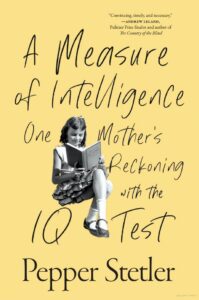 Review by Melanie McGehee
Review by Melanie McGehee
In A Measure of Intelligence, Pepper Stetler journeys through history to discover how and why society has come to define and measure intelligence as we do. She purposes to challenge our thinking, ultimately hoping for a more equitable future for those considered intellectually disabled. What would motivate a Professor of Art History at Miami University to tackle a field of study as different as this one? A mother’s love. Stetler’s daughter Louisa has Down syndrome.
In the opening pages, Stetler shares intimate moments. She tells us about her hope filled pregnancy days, joking with her husband about where their daughter might go to college. She tells us about hearing the news of their daughter’s probable diagnosis. She tells us about sitting in the school guidance counselor’s office when Louisa was in kindergarten. By that time, Louisa’s life, both her present and her future, seemed determined by her score on the IQ test, and Stetler’s mothering instincts were on high alert.
Instead of discussing her love of books, eagerness to help in the classroom, and how she struggled to slow down and count a series of blocks carefully, we were now talking about a number that plotted her on an abstract graph. It was a way of understanding who Louisa was that made her seem like a stranger to me. I don’t remember much about the meeting after this.
My ears burned red and I was lost in a swirl of questions. What exactly is an IQ test? How do you give one to a five-year-old? What did these bureaucrats think they knew about my daughter based on this test? The IQ score seemed like a suspiciously tidy way to mark Louisa’s potential. And how her potential was perceived could determine how others assessed her worth. (2)
Stetler leaves this meeting determined. She learns what an IQ test is by observing one and by taking one herself. But just as importantly, she researches and analyzes how it came to be and she takes us along on that journey. Beginning with French psychologist Alfred Binet, who attempted to quantify intelligence by ascribing mental age versus chronological age, and continuing through an analysis of the DSM’s various iterations, Stetler weaves a series of cause and effects involving at its very core our language and identities. In doing this, I believe she is successful in proving that intelligence as we think of it is “a product of history rather than an outcome of nature” ( 18).
Stetler gives examples of real-life implications around intelligence scores. Those examples come not only from her life as Louisa’s mother, but her life as a professor. She speaks of the prevalence of multiple-choice testing and how standardized tests are gatekeepers to higher education. She laments the lack of real learning and discovery time that she and her students have in class.
You may be shocked to read about some of the social policies centered around intelligence scoring that Stetler explores. For example, “In 1927, the US Supreme Court ruled that the forced sterilization of those with low IQs did not violate the Fourteenth Amendment’s equal protection clause” and that ruling has not yet been overturned. (pg 99-100) But you may also be encouraged by Stetler’s final chapters where she envisions an educational system “done right,” providing “the opportunity to learn about oneself,” and strong in “community engagement rather than a place of unhealthy competition, anxiety, and entrenched privilege” (209).
You will never, though, forget that Stetler is a mother. A mother who questions if she has done enough. A mother who feels gratified by her child’s performative successes. A mother who carefully weighs the options available for schooling. A mother who adores her child. A mother who wants more and better for the child she adores.
I would encourage everyone, whether a mother or not, to read and reckon for themselves.
A Measure of Intelligence: One Mother’s Reckoning with the IQ Test, by Pepper Stetler
Diversion Books, 20 August 2024, $27.99 [hardcover]
ISBN 9781635769357
Melanie McGehee is a mother, student, and writing workshop facilitator. She is a current MFA candidate at Wilkes University and sometimes substacks.
